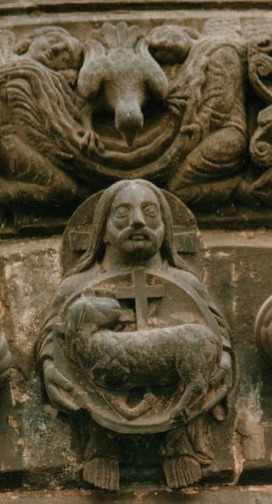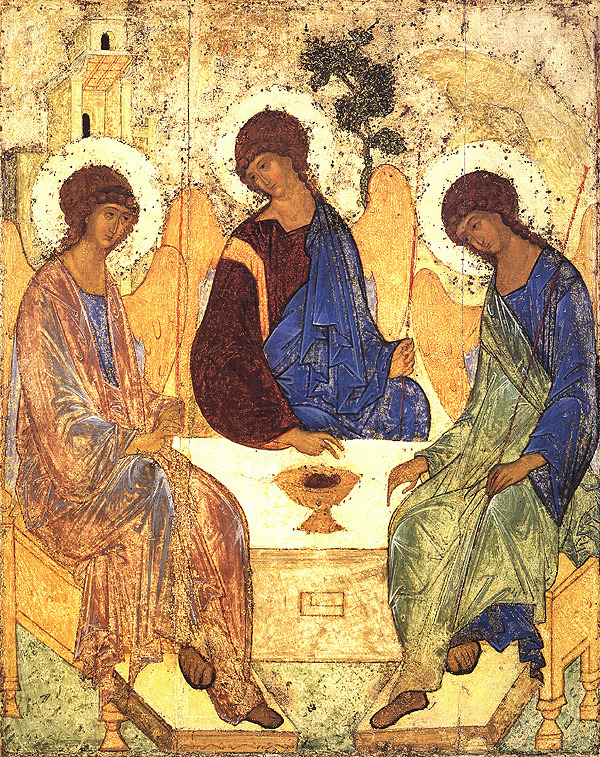If your experience is anything like mine, there’s a pretty good chance that at some point in the sermon on Trinity Sunday you will hear the minister proclaim what a difficult concept the Trinity is. On this Sunday we may hear again how St. Patrick used the three-leaved shamrock to explain the idea to the people of Ireland, or we may consider the image of the egg (shell, white, and yolk), or perhaps, if our brains are to be stretched a bit, we’ll hear how in Mere Christianity C.S. Lewis used our understanding of the dimensions of space to explain this mystery. I suppose it’s a tough Sunday for preachers, but sometimes I wonder if we don’t back away from the idea of the Trinity more than we need to.
The Trinity is a Mystery, one of many holy mysteries, and why we should find it more difficult to comprehend than any of the other mysteries is beyond me. Perhaps our difficulty comes when we try to turn that mystery into an explanation, or perhaps we overestimate our grasp of the other paradoxes of faith. Honestly, given our admittedly imperfect understanding of concrete phenomena such as the atom and the human brain, I don’t know why we should imagine that it would be any easier to comprehend the nature of God. But that doesn’t mean we shouldn’t think about it. Try to learn more.
At this point in my life, I have come to believe that the Trinity is a revelation about the nature of God and the universe. I don’t know how it works, but I sense that it is and that it is true. And what the Trinity reveals to me is relationship.
Our God does not even exist without being in relationship–it is his essence–it is his truth. And the essence of that relationship is unity and love. The truth of the world is also relationship, and the work of the world is reconciliation. Like God, we humans are always in relationship. We are born into families. Our meta-cognition is as good as a friend: that voice inside our heads, the way we watch ourselves. And all our sense-making–all the meaning we derive out of our time in this world–is at its foundation an exploration of the connections between things. Even our mirror neurons (which fire both when we do a thing and when we see it done) connect us to the world and the people we share it with. This is our nature, this is what we do.
Sadly, our relationships are not so unified as the Trinity, nor are they always grounded in love. We perceive our separation as often as we know our oneness. Even the Body suffers.
But that’s the story, isn’t it? The Fall, Salvation…we know where we are and what we have to do and what we cannot do on our own. I was struck this morning by this passage from Ephesians 4:
Rather, speaking the truth in love, we are to grow up in every way into him who is the head, into Christ, from whom the whole body, joined and knit together by every joint with which it is supplied, when each part is working properly, makes bodily growth and upbuilds itself in love.
It’s always the joints that give us trouble: achy, inflexible joints. As the years pass, I understand this more and more too.




The Trinity is also an expression of God in relation to God’s creatures, as our Creator/Father/Sovereign, as our Redeemer/Priest/Brother, as our Counselor/Comforter/Life. It is mystery that God is three-yet-one, spirit not matter, omnipotent, omniscient, omnipresent – but made God’s self known in a human limited person. It is mystery that we are made in God’s image; and it takes all of us united by the Spirit to be the body of Christ, creaky joints and all – while all these diverse people each bear the image of God in Christ and yet all are different so that no one of us can possibly be the image of God.
Maybe we should think of the Triune God as whirring with energy like a spinning top, so that we glimpse each of the 3 now and then but mostly they all blur together in rush of wind and color and imagery….